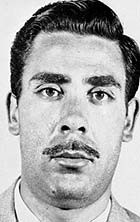Tommaso Buscetta
| Tommaso Buscetta | |
|---|---|

Tommaso Buscetta in an undated photograph
|
|
| Born |
July 13, 1928 Palermo, Sicily, Italy |
| Died |
April 2, 2000 (aged 71) New York, United States |
| Occupation | Mafioso, pentito |
| Criminal charge | |
| Criminal penalty | 14 years, later paroled |
Tommaso Buscetta (Italian pronunciation: [tomˈmaːzo buʃˈʃetta]; 13 July 1928 – 2 April 2000) was a Sicilian mafioso. He was the first Mafia boss to turn informant, and explain the inner workings of the organisation. When interviewed by Giovanni Falcone, an investigating magistrate who told informants they would face serious consequences for any false testimony, Buscetta did not mention the allegations against Giulio Andreotti that he later made and then retracted.
He was the youngest of 17 children raised in a poverty-stricken area of Palermo, which he escaped by getting involved with crime at a young age. He first became involved with the Mafia in 1945 and in the following years he became a full-fledged member of the Porta Nuova Family. His first work was mostly smuggling cigarettes.
After the Ciaculli Massacre in 1963, Buscetta fled to the United States where the local Gambino crime family helped him to get started in the pizza business. In 1968, Buscetta was convicted of double murder, but the conviction was in absentia as he was not actually in custody (In Italy, it is possible for fugitives to be prosecuted without them being present).
In 1970 Buscetta was arrested in New York. Because Italian authorities did not ask for his extradition he was released. Buscetta moved on to Brazil where he set up a drug trafficking network. In 1972 Buscetta was arrested and tortured by the Brazilian military regime, and subsequently extradited to Italy where he began a life sentence for the earlier double murder conviction. In 1980, while on a day-release from prison, he fled again to Brazil to escape the brewing Mafia War instigated by Totò Riina that subsequently led to the deaths of many of Buscetta's allies, including Stefano Bontade. Arrested once more in 1983, Buscetta was sent back to Italy. He attempted suicide, and when that failed, he decided that he was utterly disillusioned with the Mafia. Buscetta asked to talk to Giovanni Falcone and began his life as an informant.
...
Wikipedia
